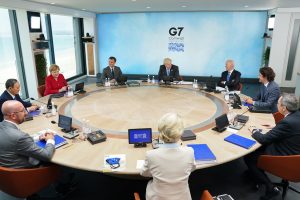The G-7 may not have evolved into a permanent Democratic 10 (D10), but last weekend’s summit in Cornwall demonstrated the value of U.S. President Joe Biden’s multilateralist approach to China. Not only are liberal democracies more united, but the now have before them a practical initiative to rival Beijing’s Belt and Road Initiative (BRI).
In the runup to this year’s G-7 meeting, there was speculation that the meeting of leaders from the world’s leading democracies would be the launch pad for a D10 grouping. With the United Kingdom hosting, Prime Minister Boris Johnson took the initiative to invite fellow democracies Australia, India, and South Korea to the summit (subsequently, South Africa was also invited to join). The D10, as envisioned by Johnson’s team, would address issues relating to supply chains and 5G telecommunications.
While both issues are intrinsically linked to China, proposers of the D10 nevertheless insisted that it would not be an anti-China alliance. Yet such denials, genuine or not, failed to convince those cautious European nations keen to preserve their own distinctive, and less combative, approach to Beijing. These early signals should have made it clear that a formal D10 was not in the cards.
For now, the expansion of the D10 has been put on hold. Dominic Raab, the U.K.’s foreign secretary, has conceded that it is far easier to work with a cluster of liked-minded nations on an issue-by-issue basis than formally restructure the G-7.
Nevertheless, such a setback should not overshadow the Biden administration’s successes, so far, in bringing the world’s liberal democracies together in a shared China-skeptical stance. The G-7’s Leaders’ communique, “Our Shared Agenda for Global Action to Build Back Better,” is a testament to this.
This is not to pretend that previous divisions no longer exist. Both France and Germany will want to maintain Europe’s independence from Washington, while Johnson will no doubt continue trying to, as one official of an allied G-7 country put it “have his cake and eat it on China.” From time to time, do not be surprised to see leaders softening their tone either by denying any hostility toward Beijing or speaking of the need to cooperate on climate change. However, the G-7 Leaders’ communique contains several significant points in relation to China.
This included calling for a fresh inquiry into the origins of the COVID-19 outbreak and for China to respect human rights in Xinjiang. Beijing’s assault on Hong Kong’s autonomy, and by extension the Sino-British Joint Declaration, received a mention. The communique also underscored the importance of peace and stability in the Taiwan Strait. The issue has long been untouched by G-7 leaders, but both the United States and Japan have been encouraging allies to speak out on in recent months.
The most significant, and potentially transformative, announcement from the summit was the confirmation of an alternative to China’s Belt and Road Initiative (BRI) called Build Back Better World (B3W). The initiative not only seeks to challenge Beijing’s growing influence across the developing world, but – with its emphasis on values, high quality, and transparency – attempts to alleviate the worst aspects of China’s global infrastructure investments, which include deteriorating human rights and environmental standards and the potential for debt traps. However, the details on how this will be funded remain vague.
Convincing the G-7 to contribute to the hundreds of billions needed for B3W is now the challenge for the Biden Administration. While the theme of “building back better” ran throughout the G-7 summit, committing members to cough up the cash will likely prove trickier than getting them to sign up to a shared set of words and values.
Nevertheless, with coordinated sanctions in relation to Xinjiang earlier this year the Biden administration has already scored a win when it comes to encouraging collective action even when prospects look slim. As one State Department official put it: “If you had asked me six months ago if I thought Brussels, Ottawa, London and Washington would join together on human rights sanctions against China, I would have bet against it.”
China policies in the liberal democratic world are moving at a rapid rate. While China skepticism has not accelerated at the pace necessary to see the formation of a new democratic alliance or grouping, it has helped unify the G-7. As many Western China watchers have noted, China’s presence on this G-7 summit’s agenda was much greater than it has been in previous years, with leaders calling out Beijing on several sensitive subjects. Undoubtedly, this is in part due to the Biden administration’s multilateralist approach. The question now is: Can the man who has put America back at the table convince his country’s allies to collectively flex their financial muscle?

































